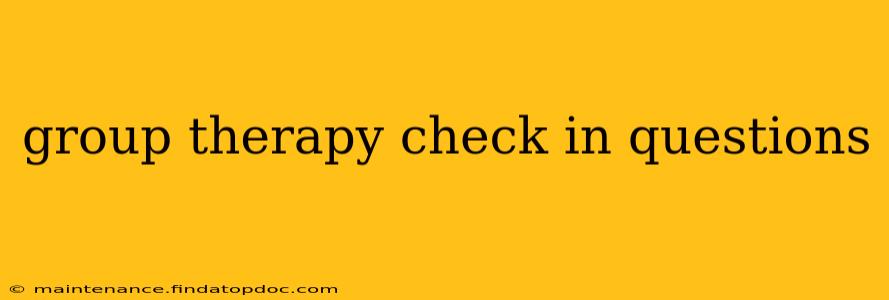Group therapy offers a powerful space for shared healing and growth. Effective check-in questions are crucial for setting the tone, encouraging participation, and fostering a safe and supportive environment. This guide explores various check-in questions, categorized for different group needs and goals, offering insights for both facilitators and participants.
What are Some Good Check-in Questions for Group Therapy?
The best check-in questions are open-ended, encouraging reflection and self-expression without feeling overly intrusive. They should be tailored to the group's specific needs and the stage of therapy. Here are a few examples, categorized for clarity:
General Well-being Check-ins:
- "How are you feeling today, on a scale of 1 to 10, and what's contributing to that number?" This provides a quick overview of the group's emotional landscape while prompting individuals to identify specific factors influencing their well-being.
- "What's one word that describes your current emotional state?" This simple question can be surprisingly revealing and offers a quick entry point for sharing.
- "What's something you're grateful for today?" Focusing on gratitude can shift the focus toward positive aspects and foster a sense of appreciation.
- "What's been your biggest challenge this week, and what coping mechanisms did you utilize?" This encourages reflection on difficulties and the development of healthy coping strategies.
Check-ins Focused on Specific Therapeutic Goals:
- (For groups focused on anxiety): "What's one anxious thought you've experienced this week, and how did you respond to it?" This targets a specific issue and promotes skill-building.
- (For groups focused on trauma): "What's one thing you did this week to prioritize self-care?" This gently encourages self-compassion and attention to well-being within the context of trauma recovery. It’s important to be mindful of pacing and triggering potential with trauma-focused groups.
- (For groups focused on addiction recovery): "What was your biggest temptation this week, and how did you resist it?" This fosters accountability and strengthens coping mechanisms within the context of recovery.
- (For groups focused on depression): "What's one small step you took this week to improve your mood, even if it felt insignificant?" Focusing on small victories can build momentum and combat feelings of helplessness.
Check-ins Encouraging Connection and Sharing:
- "What's one thing you're looking forward to this week?" This fosters optimism and a sense of anticipation.
- "Is there anything you'd like to share with the group today, related to your therapy goals or personal experiences?" This provides an open invitation to share, allowing individuals to choose the level of disclosure they are comfortable with.
- "What's one positive interaction you had this week?" This highlights social connection and positive experiences.
How to Choose the Right Check-in Questions
The choice of check-in questions depends on several factors:
- Group Composition: The questions should be appropriate for the age, background, and therapeutic goals of the group members.
- Group Stage: Early sessions may benefit from simpler, more general questions to build trust. As the group progresses, questions can become more focused and in-depth.
- Group Dynamics: The facilitator should be sensitive to the group's energy and adapt the questions accordingly. If the group seems particularly tense, a gentler approach might be needed.
- Therapist's Goals: The questions should support the overall therapeutic goals of the group.
What Makes a Good Check-in Question?
A good check-in question is:
- Open-ended: It encourages detailed responses, rather than simple "yes" or "no" answers.
- Specific: It targets a relevant aspect of the therapeutic process.
- Safe: It avoids triggering sensitive issues or putting individuals on the spot.
- Respectful: It values individual experiences and perspectives.
What if Someone Doesn't Want to Answer?
It’s crucial to create a non-judgmental and accepting atmosphere. If someone doesn’t wish to answer, respect their choice without pressure. You could simply say something like, "That's perfectly okay. We understand that sharing isn't always easy, and you can pass if you prefer."
Remember, the check-in is a tool to facilitate connection and reflection, not a performance evaluation. By using well-chosen questions and creating a supportive environment, group therapy check-ins can become a valuable part of the healing journey.
